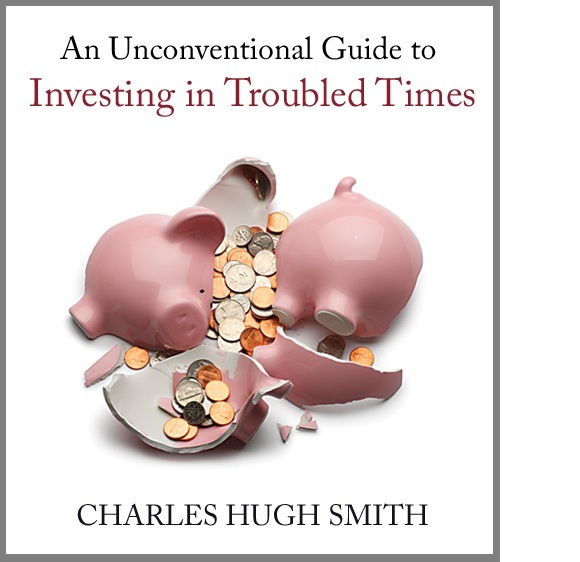Ben Bernanke's zero-interest rate policy (ZIRP) and command-economy efforts to maintain mispricing of risk, debt and assets are destroying capital and capitalism. No wonder his policies have failed so miserably.
To understand why Federal Reserve Chairman Ben Bernanke's efforts to restart economic "growth" have failed so completely and miserably, we need to compare the present with the end of the Great Depression. There is a wealth of irony in the Chairman's supposed expertise on the Great Depression, as his policies have backfired on "fixing" the Great Recession.
Rather than "fix" the economic malaise by re-inflating the credit-boom bubble, he has only increased the systemic vulnerability to a much greater crash.
This is akin to an "expert" on World War I recommending a bigger, stronger more costly
Maginot Line as the "solution" to military vulnerability.
In the Great Depression, excessive speculation built on systemic fraud and embezzlement led to the implosion of a vast credit bubble.
The "solution" touted then and now by saviors of the Status Quo was to "save" the financial sector and debtors by substituting Federal spending (with the money being borrowed via the full faith and credit of the U.S.A.) for collapsing private borrowing and spending.
This "solution" failed because it refused to address the real problem, which was over-indebtedness in service of mal-investment. People lost faith in the system for good reason--it was fraudulent and opaque, and thus mispriced risk. If you can't price risk or assets, then it's insane to either borrow or invest.
The "solution" to the Great Depression was massive Federal debt and spending on World War II--but the "solution" had a key characteristic that is almost universally ignored.
Depression-era calls to bulldoze homes to be rebuilt and destroy grain so it could be regrown were rightly dismissed as mal-investment on a vast scale. But war is more or less an equivalent "consumer" via destruction. Hundreds of ships were built and then sunk, thousands of aircraft were built and then shot down or lost, and monumental mountains of provisions and supplies were manufactured and then either consumed or lost to enemy submarines, bad weather, rot and a host of other causes.
At the end of the war, most of the leftover goods manufactured--ships, tanks, aircraft, munitions, etc.--were mothballed or scrapped.
Despite this staggering waste, the war spending launched a long boom. How did it work this magic? One, it constructed new plant; unlike the Keynesian calls to bulldoze houses so they could be rebuilt, the war investment created factories that could then be converted to produce consumer goods.
More importantly, the war spending created a vast pool of private capital--what we call savings. As resources were diverted to the war effort, rationing limited both the manufacture and availability of consumer goods. Meanwhile, tens of millions of people were put to work, either in the Armed Forces or in the war manufacturing sector, and most had few opportunities to spend money. Industrialists also piled up war profits.
Though extend-and-pretend policies did not write off the overhang of debt that had depressed the economy and destroyed the market's ability to properly price risk and assets, this gargantuan pool of private capital simply overwhelmed the remaining debt overhang.
Third, trust in the system was restored: the Federal government had effectively "won the war" by printing money and drawing upon the nation's vast surplus of energy and labor, and the manufacturing and financial sectors had been brought to heel by the extraordinary demands of the war and by legislation that had responded to financial fraud and over-reach.
Recall that the root of "capitalism" is capital. Capitalism requires two fundamentals--capital to invest and open markets for goods and services that openly price risk, assets, hedges and goods.
Note that debt is not listed. Debt is not essential to capitalism. Indeed, if we explore the roots of modern capitalism in the 14th and 15th centuries, we find that commercial credit and hedges were the key ingredients, not debt. Lacking sufficient coinage to handle the rising volume of trade, merchants settled accounts at the great trading fairs in Europe.
Long, risky trade voyages were hedged with the equivalent of options and limited stock companies that distributed risk for a price. Leverage was limited by the transparency and appetite for risk.
Compare that with Bernanke's policies, all of which severely punish savers (i.e. the accumulation of capital) and reward leverage and debt. By lowering interest rates to zero, Bernanke has imposed the opposite of the World War II experience of forced savings--he has made cash into trash and pushed everyone into risk assets.
By making credit dirt-cheap and backstopping financial-sector losses (i.e. institutionalizing moral hazard), Bernanke has destroyed the market's ability to discipline mal-investment and openly price risk and assets.
World War II launched a boom precisely because private capital accumulation/savings were enforced; when the war ended, there was a vast pool of capital available for investment and consumption.
Bernanke's policy is to punish capital accumulation and reward leveraged debt expansion. Rather than enforce the market's discipline and transparent pricing of risk, debt and assets, Bernanke has explicitly set out to re-inflate a destructive, massively unproductive credit bubble.
This is why Bernanke has failed so completely, and why he will continue to fail. He is not engaged in capitalism, he is engaged in the destruction of capital, investment discipline and the open pricing of risk, debt and assets. When the next "credit event" sweeps round the Fed's Maginot Line of encouraging mal-investment and masking fraud and rolls up the entire financial sector's defenses against mispriced risk and credit, Bernanke will be inside the over-run HQ, wondering how his "brilliant" policies could have failed so spectacularly.

| Thank you, Timothy F. ($5), for your most-welcome generous contribution to this site -- I am greatly honored by your support and readership. | | Thank you, CopperAwning.com ($25), for your remarkably generous contribution to this site -- I am greatly honored by your support and readership. |

























